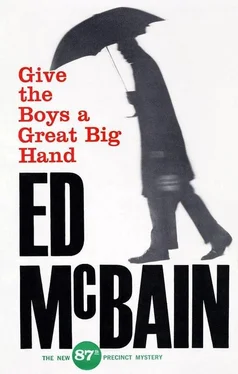“Yes, and you didn’t quarrel at the breakfast table. Why didn’t you report his absence until the next day?”
“Because I thought—”
“Had he ever wandered off before?”
“No, he—”
“Then this was rather unusual for him, wasn’t it?”
“Yes, but—”
“Then why didn’t you report it immediately?”
“I thought he’d come back.”
“Or did you think he had reason for staying away?”
“What reason?”
“You tell me, Mrs. Androvich.”
The room went silent.
“There was no reason,” she said at last. “My husband loved me. There was a box of candy on the table in the morning. A heart. The florist delivered a dozen red roses at six o’clock. Karl kissed me goodbye and left. And I haven’t seen him since.”
“Give Mrs. Androvich a receipt for this meat cleaver, Bert,” Carella said. “Thank you very much for the coffee and rolls. And for your time. You were very kind.”
As they went out, she said, “He is dead, isn’t he?”
Claire Townsend was easily as tall as Meg Androvich, but the similarity between the two girls ended there. Meg was skinny — or, if you prefer, willowy; Claire was richly endowed with flesh that padded the big bones of her body. Meg, in the fashion-model tradition, was flat-chested. Claire was not one of those overextended cow-like creatures, but she was rightfully proud of a bosom capable of filling a man’s hand. Meg was a blue-eyed blonde. Claire’s eyes were brown and her hair was as black as sin. Meg, in short, gave the impression of someone living in the pallor of a hospital sickroom; Claire looked like a girl who would be at home on a sun-washed haystack.
There was one other difference.
Bert Kling was madly in love with Claire.
She kissed him the moment he entered the apartment. She was wearing black slacks and a wide, white, smock-like blouse that ended just below her waist.
“What kept you?” she said.
“Florists,” he answered.
“You bought me flowers?”
“No. A lady we talked to said her husband bought her a dozen red roses. We checked about ten florists in the immediate and surrounding neighborhoods. Result? No red roses on Valentine’s Day. Not to Mrs. Karl Androvich, anyway.”
“So?”
“So Steve Carella is uncanny. Can I take off my shoes?”
“Go ahead. I bought two steaks. Do you feel like steaks?”
“Later.”
“How is Carella uncanny?”
“Well, he lit into this skinny, pathetic dame as if he were going to rip all the flesh from her bones. When we got outside, I told him I thought he was a little rough with her. I mean, I’ve seen him operate before, and he usually wears kid gloves with the ladies. So with this one, he used a sledgehammer, and I wondered why. And I told him I disapproved.”
“So what did he say?”
“He said he knew she was lying from the minute she opened her mouth, and he began wondering why.”
“How did he know?”
“He just knew. That’s what was so uncanny about it. We checked all those damn florists, and nobody made a delivery at six in the morning, and none of them were even open before nine.”
“The husband could have ordered the flowers anywhere in the city, Bert.”
“Sure, but that’s pretty unlikely, isn’t it? He’s not a guy who works in an office some place. He’s a seaman, and when he’s not at sea, he’s home. So the logical place to order flowers would be a neighborhood florist.”
“So?”
“So nothing. I’m tired. Steve sent a meat cleaver to the lab.” He paused. “She didn’t look like the kind of a dame who’d use a meat cleaver on a man. Come here.”
She went to him, climbing into his lap. He kissed her and said, “I’ve got the whole weekend. Steve’s giving me his Sunday.”
“Oh? Yes?”
“You feel funny,” he said.
“Funny? How?”
“I don’t know. Softer.”
“I’m not wearing a bra.”
“How come?”
“I wanted to feel free. Keep your hands off me!” she said suddenly, and she leaped out of his lap.
“Now you are the kind of a dame who would use a meat cleaver on a man,” Kling said, appraising her from the chair in which he sat.
“Am I?” she answered coolly. “When do you want to eat?”
“Later.”
“Where are we going tonight?” Claire asked.
“No place.”
“Oh?”
“I don’t have to be back at the squad until Monday morning,” Kling said.
“Oh, is that right?”
“Yes, and what I planned was—”
“Yes?”
“I thought we could get into bed right now and stay in bed all weekend. Until Monday morning. How does that sound to you?”
“It sounds pretty strenuous.”
“Yes, it does. But I vote for it.”
“I’ll have to think about it. I had my heart set on a movie.”
“We can always see a movie,” Kling said.
“Anyway, I’m hungry right now,” Claire said, studying him narrowly. “I’m going to make the steaks.”
“I’d rather go to bed.”
“Bert,” she said, “man does not live by bed alone.”
Kling rose suddenly. They stood at opposite ends of the room, studying each other. “What did you plan on doing tonight?” he asked.
“Eating steaks,” she said.
“And what else?”
“A movie.”
“And tomorrow?”
Claire shrugged.
“Come here,” he said.
“Come get me,” she answered.
He went across the room to her. She tilted her head to his and then crossed her arms tightly over her breasts.
“All weekend,” he said.
“You’re a braggart,” she whispered.
“You’re a doll.”
“Am I?”
“You’re a lovely doll.”
“You going to kiss me?”
“Maybe.”
They stood not two inches from each other, not touching, staring at each other, savoring this moment, allowing desire to leap between them in a mounting wave.
He put his hands on her waist, but he did not kiss her.
Slowly, she uncrossed her arms.
“You really have no bra on?” he asked.
“Big weekend lover,” she murmured. “Can’t even find out for himself whether or not I have a—”
His hands slid under the smock and he pulled Claire to him.
The next time anyone would see Bert Kling would be on Monday morning.
It would still be raining.
Sam Grossman studied the airlines bag for a long time, and then took off his eyeglasses. Grossman was a police lieutenant, a laboratory technician, and the man in charge of the police lab downtown on High Street. In his years of service with the lab, he had seen bodies or portions of bodies in trunks, valises, duffel bags, shopping bags, boxes, and even wrapped in old newspapers. He had never come across one in an airline’s overnight bag, but he experienced no sensation of surprise or shock. The inside of the bag was covered with dried blood, but he did not reel back at the sight of it. He knew there was work to be done, and he set about doing it. He was somewhat like a New England farmer discovering that one of his fields would make an excellent pasture if only it were cleared of rocks and stumps. The only way to clear the field was to clear it.
He had already examined the severed hand, and reached the conclusion that it was impossible to get any fingerprint impressions from the badly mutilated fingertips. He had then taken a sampling of blood from the hand for an isoreaction test, and concluded that the blood was in the “O” group.
Now he examined the bag for latent fingerprints, and found none. He had not, in all truth, expected to find any. The person who’d mutilated that hand was a person who was very conscious of fingerprints, a person who would have shown the same caution in handling the bag.
Читать дальше





![Ричард Деминг - Whistle Past the Graveyard [= Give the Girl a Gun]](/books/412176/richard-deming-whistle-past-the-graveyard-give-t-thumb.webp)






